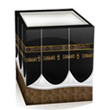Stoning the Jamaraat is not stoning the Shaytan! Explained by Shaykh Uthaymeen
- Details
- Category: Articles
- Published on Wednesday, 03 September 2014 19:00
- Hits: 853
Stoning the Jamaraat is not stoning the Shaytan! Explained by Shaykh Uthaymeen
Many of the common people believe that stoning the Jamaraat is stoning the Shaytan. And they say: ‘Verily we will stone the Shaytan’. And you will find some of the people coming with extreme violence, anger and rage, shouting, cursing and insulting these Jamaraat; and with Allah refuge is sought. It is to the extent that before the bridge was built around the Jamaraat I saw a man and his wife standing in the gravel using their sandals or their shoes to beat this fixed column while they were insulting and cursing it. And what is amazing is that the stones (thrown by others) were hitting them and they did not care about this. And this is from great ignorance.
Indeed the stoning of the Jamaraat is a great act of worship. The Messenger of Allah peace be upon him said about it:
َ
Tawaaf around the House and (Saa’i) between al-Safa and al-Marwah and the stoning of the Jamaraat have only been prescribed so that remembrance of Allah will be established.” (Sunan Abi Dawud 1888)
This is the wisdom for these Jamaraat. For this reason the person says ‘Allahu Akbar’ with every stone’s thrown. He does not say, ‘I seek refuge with Allah from the accused Shaytan.’ Rather he says, ‘Allahu Akbar’; exalting Allah the One who prescribed stoning these Jamarat.
And it is in reality—meaning the stoning of the Jamaraat—the utmost devotion and humility to Allah the Exalted. This is because the person does not know the wisdom for stoning these Jamaraat in these places except that it is general devotion to Allah the Exalted, and the person submitting to the obedience to Allah, thus it is the utmost in humility and devotion.
As it relates to acts of worship; some acts of worship the wisdom behind it is known to us and it is apparent, thus the person submits to it worshipping Allah and obeying
Him, and then following what he knows of it benefits. And there are some acts of worship in which the wisdom behind it is not known; but the fact that Allah ordered with it, and to devote oneself to it is worship; this is wisdom. As Allah the Exalted said:
ِِْ
It is not for a believer, man or woman, when Allah and His Messenger have decreed a matter that they should have any option in their decision. (Soorah Al Ahzab 33:36)
And that which occurs in the heart from turning to Allah with repentance and devotion, humility, and acknowledging the perfection of the Lord and the deficiency of the slave and his complete need of his Lord; this is from the greatest and best benefits.
Questioner: Isn’t this the place where Shaytan stood appearing to Ibrahim Al Khaleel peace be upon him?
Shaykh Uthaymeen: This has been narrated in a hadith1 and Allah knows best concerning its authenticity. Even if we say it is authentic, this does not mean we do that as it was done by Ibrahim. Do you see that the origin of the Saa’i between al-Safa and al-Marwah is the Saa’i of the mother of Ismael after they were stricken with hunger and thirst, thus she began searching to see if anyone was in the area. We do not perform Saa’i for this purpose, we only perform Saa’i as worship of Allah the Exalted, and to exalted Him, and draw near to Him, so He may forgive us and have mercy upon us. Therefore even if the origin of an act of worship was for a particular reason it is not binding that this reason remain until the Day of Judgment.
Also as it relates to the raml (to uncover the right shoulder and walk quickly with short steps)—and it is during the first three circuits for the Tawaf of arrival when the person first arrives whether it is the Tawaf of arrival or the Tawaf of Umrah—the origin of this was the Prophet peace be upon him did it to provoke the pagans with it. Those pagans who—when the Prophet peace be upon him arrived for the Umrah of Qada said— ‘coming to you are a people who have been weaken by the fever of Medina’ (Sunan Abi Dawud 1886, Al Albani).
Thus the origin of this legislation was for this purpose while now we do not do it to provoke the pagans because this no longer exists; but the worship remains. This proves
1 Narrated by At Tabaraani, Al Haakim, and Al Baahayqi from the hadith of Ibn Abbas: When the Khaleel of Allah
came to perform the rites, Shaytan appeared to him at the Jamarat of Al ‘Aqabah thus he threw seven stones at him until he sank into the earth. Then he appeared to him at the second Jamarat, so he threw seven stones at him until he sank into the earth. And then he mentioned the third Jamarat likewise. (Authenticated by Shaykh Al Albani Sahih At Targheeb 1156)
to us that it is not binding that because this particular action, the origin of the rites was such and such that now our performing this action is the same reason it was legislated for.





















